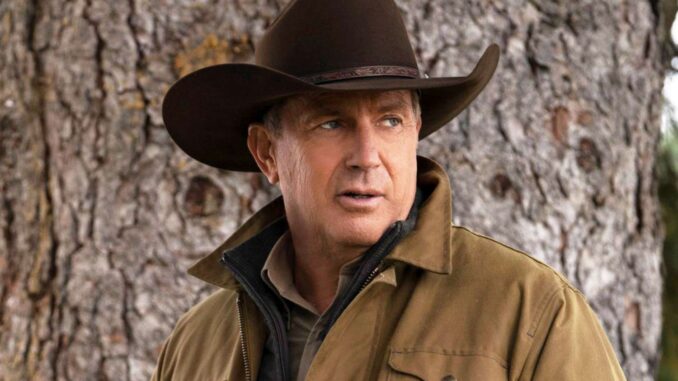
The Montana wind, a constant, unseen character in the epic saga of Yellowstone, carries with it the scent of pine and damp earth, the whisper of forgotten battles, and now, the faint, melancholic echo of a closing chapter. For six seasons, audiences have been drawn into the brutal, beautiful world of the Dutton ranch, a sprawling kingdom fiercely defended by its patriarch, John Dutton. But as the sun sets on this modern Western, casting long shadows across the rugged landscape, the shifting dynamics behind the scenes are as compelling as any on-screen conflict. Luke Grimes, who embodies the conflicted soul of Kayce Dutton, offers a glimpse into this bittersweet transition, his words a poignant reflection on Kevin Costner’s departure and the show’s inevitable, final stretch.
Costner’s portrayal of John Dutton was more than just an acting performance; it was the gravitational pull around which the entire Yellowstone universe orbited. His very presence, like the ancient peaks that guarded the Dutton ranch, felt unmovable, a primal force of nature. He was the stoic embodiment of an America fast disappearing, clinging to land and legacy with a ferocity that bordered on obsession. To imagine Yellowstone without John Dutton, or indeed, without Costner, felt akin to the Yellowstone River drying up – a cataclysmic shift. Grimes, speaking from within the eye of this storm, acknowledges the seismic void left by Costner’s exit. It’s a departure that necessitates not just a narrative pivot but an emotional reckoning for the remaining cast and crew, who must navigate the final acts of a story whose central pillar has been removed. His candor speaks to the professional respect and personal impact Costner had on the set, a recognition that the show will conclude in a dramatically altered landscape, both literally and metaphorically.
Yet, as Grimes opens up about this monumental shift, his perspective is also tinged with the weary resolve of Kayce Dutton himself. Kayce has always been the Dutton son most caught between worlds – the call of the wild and the demands of family, the badge of the law and the lawlessness of his kin. He is the quiet observer, often bearing the weight of his family’s sins and the relentless pursuit of their legacy. In a similar vein, Grimes’s reflections on the "final stretch" resonate with the exhaustion and quiet gratitude of an actor who has poured years into a demanding, iconic role. He speaks not just of the logistical challenges of filming without Costner, but of the palpable sense of an ending, a finality that looms over the sprawling Montana sets. There is an implicit acknowledgment of the intense bond forged over years, the camaraderie of enduring harsh weather, complex storylines, and the immense pressure of a global phenomenon. The "final stretch" isn't merely a production schedule; it’s an emotional marathon, a long farewell to a chapter that has defined a significant portion of their lives.
The nature of Yellowstone's ending, precipitated in part by Costner's departure, transforms the "final stretch" into something more profound than a simple conclusion. It becomes a meditation on legacy itself, both within the fictional Dutton universe and for the show’s place in television history. How do you tie up the sprawling threads of land disputes, family feuds, and existential crises when your central antagonist-protagonist is gone? Grimes's quiet contemplation suggests that the remaining narrative will likely focus more intently on the children and the future, forcing characters like Kayce to step out of John’s shadow and truly inherit the complex, often bloody, legacy. This shift, born of necessity, could well imbue the final episodes with a raw vulnerability, stripping away some of the patriarch's impregnable armor to reveal the enduring human drama beneath.
Ultimately, Luke Grimes’s insights serve as a compass for the audience as Yellowstone prepares its final bow. His honesty about Costner's absence and the looming end anchors the show's grand narrative in a very human reality: goodbyes are hard, even when they’re inevitable. Just as the Duttons fight to preserve their way of life against the relentless tide of modernity, the cast and crew are now navigating the final days of a creative endeavor that has become a part of their own personal histories. The wind may still whisper through the lodgepole pines, and the Yellowstone River will continue its ceaseless flow, but the specific, epic, and unforgettable saga of the Duttons, as we have known it, is preparing for its final, poignant ride into the sunset, guided by the quiet reflections of those who lived it.
